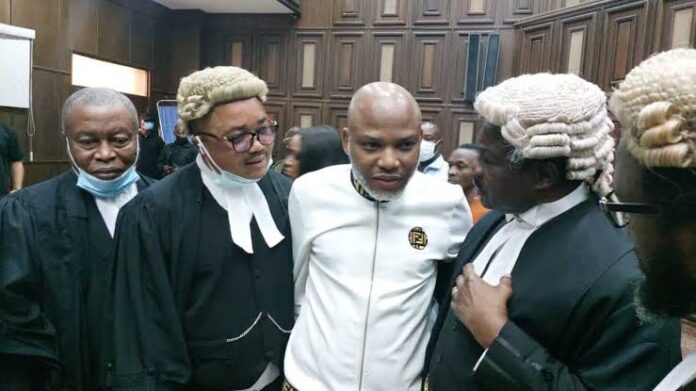The leader of the Indigenous People of Biafra (IPOB), Nnamdi Kanu, has expressed his lack of confidence in obtaining justice from the courts in Abuja.
Speaking during a routine meeting with his legal team at the Department of State Services (DSS) facility in Abuja on Friday, Kanu accused the judiciary of succumbing to political influence.
Kanu’s lead counsel, Aloy Ejimakor, issued a statement detailing the IPOB leader’s concerns about his ongoing legal battles.
Claims of Political Influence
Kanu alleges that his trial is being shaped not by the rule of law but by what he described as “dirty and deadly politics.” He claimed that those benefiting from Nigeria’s insecurity are influencing court decisions to ensure unfavourable outcomes for him and IPOB.
“The way and manner the laws are applied to him are not in conformity with the written laws of Nigeria or the pertinent international laws,” Ejimakor stated, quoting Kanu.
Kanu believes that his trial has become a tool for his opponents to tarnish his reputation and undermine the IPOB’s mission for self-determination.
Context of the Legal Battle
Nnamdi Kanu has been at the centre of legal and political controversies since his arrest and extradition to Nigeria in 2021. He faces charges of treason, terrorism, and incitement due to his activities as the leader of IPOB, a group advocating for the secession of the southeastern region of Nigeria to form an independent Biafran state.
The Nigerian government has maintained that Kanu’s actions threaten national unity and security. However, his supporters view him as a freedom fighter striving to address longstanding grievances of the Igbo people.
In October 2022, the Court of Appeal in Abuja discharged Kanu of the charges, citing procedural irregularities in his extradition from Kenya. However, the Nigerian government appealed the ruling, and Kanu remains in custody.
Accusations of Bias
Kanu accused those he called “beneficiaries of insecurity” of driving the decisions in his case. He urged the public to scrutinise the court decisions to see how justice has been subverted.
“If justice were to be done,” he said through his counsel, “the well-orchestrated and heavily funded attacks and demonisation of his person and his lofty mission would no longer resonate with the public.”
Kanu lamented that the judiciary has been weaponised against him, and he urged Nigerians to critically examine how the law is being applied in his case.
“The way and manner the laws are applied to him are not in conformity with the written laws of Nigeria or the pertinent international laws,” Aloy Ejimakor, lead counsel to Nnamdi Kanu.
“If justice were to be done, the well-orchestrated and heavily funded attacks and demonisation of his person and his lofty mission would no longer resonate with the public. Onyendu MNK urged the public to read all court decisions and judgements pertaining to him and IPOB to understand that what the law says is not what is being done.”
Legal and Political Reactions
The IPOB leader’s trial has sparked heated debates across Nigeria and beyond. Human rights groups have raised concerns about the fairness of his treatment, citing violations of due process in his extradition and detention.
Amnesty International has repeatedly called for Kanu’s release, arguing that his continued detention without fair trial violates his human rights. The organisation has also criticised the Nigerian government for what it describes as excessive use of force in dealing with IPOB supporters.
On the other hand, federal authorities insist that Kanu’s prosecution is necessary to maintain peace and stability in the country. The Attorney General of the Federation, Abubakar Malami, has dismissed claims of political bias, insisting that the government’s actions are within the law.
IPOB’s Role in Regional Tensions
The IPOB has been linked to a series of violent incidents in the southeastern region, including attacks on security personnel and government facilities. While Kanu denies any involvement in violence, the group’s activities have led to heightened tensions between the government and the region.
The Nigerian government has designated IPOB as a terrorist organisation, a move that has been criticised by some international observers who see it as a clampdown on dissent.
Kanu’s supporters argue that the government’s heavy-handed approach has deepened mistrust and worsened the region’s sense of marginalisation.
Kanu’s Message to the Public
Despite his legal troubles, Kanu remains defiant. He called on Nigerians to critically analyse his trial and see it as an example of how justice is being undermined.
“Onyendu MNK urged the public to read all court decisions and judgements pertaining to him and IPOB to understand that what the law says is not what is being done,” Ejimakor said in the statement.
Kanu also described his trial as a “sham designed to destroy truth and justice,” accusing the authorities of using legal proceedings to delegitimise his cause.
Broader Implications
Kanu’s remarks highlight the ongoing tension between the Nigerian government and separatist movements. His trial continues to attract international attention, with many observers viewing it as a litmus test for Nigeria’s commitment to justice and the rule of law.
As the legal battles drag on, the outcome of Kanu’s case could have significant implications for Nigeria’s stability, particularly in the southeast. For now, Kanu remains resolute in his fight for what he calls “truth and justice,” even as he faces an uncertain future in the courts.

